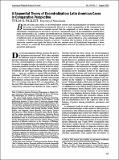| dc.description.abstract |
Both advocates and critics of decentralization assume that decentralization invariably increases the power of subnational governments. However, a closer examination of the consequences of decentralization across countries reveals that the magnitude of such change can range from substantial to insignificant. In this article, I propose a sequential theory of decentralization that has three main characteristics: (1) it defines decentralization as a process, (2) it takes into account the territorial interests of bargaining actors, and (3) it incorporates policy feedback effects. I argue that the sequencing of different types of decentralization (fiscal, administrative, and political) is a key determinant of the evolution of intergovernmental balance of power. I measure this evolution in the four largest Latin American countries and apply the theory to the two extreme cases (Colombia and Argentina). I show that, contrary to commonly held opinion, decentralization does not necessarily increase the power of governors and mayors. |

